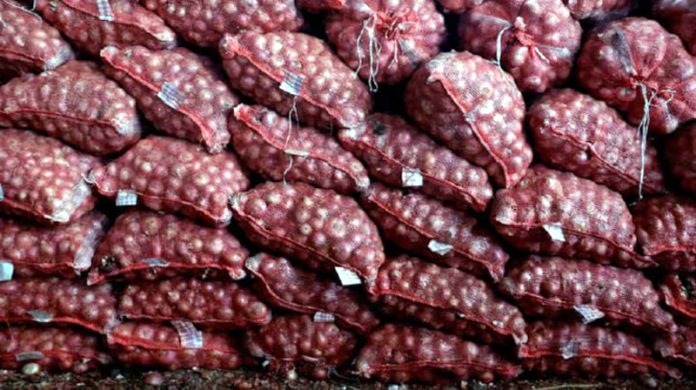NEW DELHI, Mar 26: Amid concern over likely fall in mandi prices in view of extension of onion export ban, the Government on Tuesday assured farmers that it will start procurement of 5 lakh tonnes of rabi onion in next 2-3 days to protect their interest.
Last week, the commerce ministry extended the ban on onion export till further orders. The ban on onion shipment was valid till March 31.
“We want to assure farmers that their concern will be taken care of. …We will begin procurement of 5 lakh tonne of rabi (winter) crop in the next 2-3 days for maintaining a buffer stock,” Consumer Affairs Secretary Rohit Kumar Singh told reporters.
The onion export ban is affecting traders and not farmers as average mandi (wholesale) prices are ruling currently at around Rs 13-15/kg in Maharasthra, which is almost double from the previous year level, he said.
“Even if prices crash, we will protect the interest of farmers,” he added.
The secretary said the government normally buys onion for the buffer stock at a prevailing mandi rates. However if the rates fall below the cost of production, the government will ensure their cost is covered at least.
In 2023-24, the government had procured 6.4 lakh tonnes of onion (both rabi and kharif crops) for the buffer stock at an average rate of Rs 17 per kg. Almost entire quantity has been disposed off, he said.
Nidhi Khare, Officer on Special Duty in the Consumer Affairs Ministry, said the onion procurement during the last year was done in June but this year it is going to kick-start early in the next two days.
Two nodal cooperative agencies — Nafed and National Cooperative Consumers’? Federation of India (NCCF) — will undertake procurement, she said.
For the procurement, NAFED and NCCF are to pre-register the onion farmers to ensure that payments to the farmers are transferred to their bank accounts through Direct Benefit Transfer.
About the impact of likely fall in rabi onion production on retail prices, the secretary said the average retail prices are currently stable at Rs 33/kg in the country.
The government has chalked out an action plan to address the supply-demand gap in two ways. The government is testing improving shelf life of 1,322 tonnes of onion through radiation treatment, and secondly farmers in key growing areas will be encouraged to grow early kharif crop subject to weather conditions, he said.
Rabi onion production is estimated to decline by 20 per cent to 190.5 lakh tonnes in the 2023-24 season (July-June), as against 237 lakh tonnes in the year-ago period as per the agriculture ministry data.
Rabi onion is critical for country’s onion availability as it contributes 72-75 per cent of annual production in the country. The rabi onion is also crucial for ensuring year-round availability of onion as it has better shelf life compared to Kharif (summer) onion and can be stored for supplies till November-December.
In a separate statement, the consumer affairs ministry said the recent decision to extend onion export prohibition has been necessitated by the overall domestic availability against the prevailing international prices and global availability concerns.
The government, meanwhile, has allowed exports to neighbouring countries that rely on India for their domestic consumption requirements. The government has allowed the export of onion to Bhutan (550 tonnes), Bahrain (3,000 tonnes), Mauritius (1,200 tonnes), Bangladesh (50,000 tonnes) and UAE (14,400 tonnes i.E. 3,600 tonnes/ quarter).
The ministry also mentioned that the continuous procurements by NAFED and NCCF have guaranteed remunerative prices for onion farmers all through the year in 2023. Subsequently, the government adopted retail sale intervention for disposal of onion at subsidized price of Rs 25 per kg last year.
“The timely intervention and calibrated release ensured stabilization of retail prices effectively without impacting farmer realization,” it added. (PTI)


